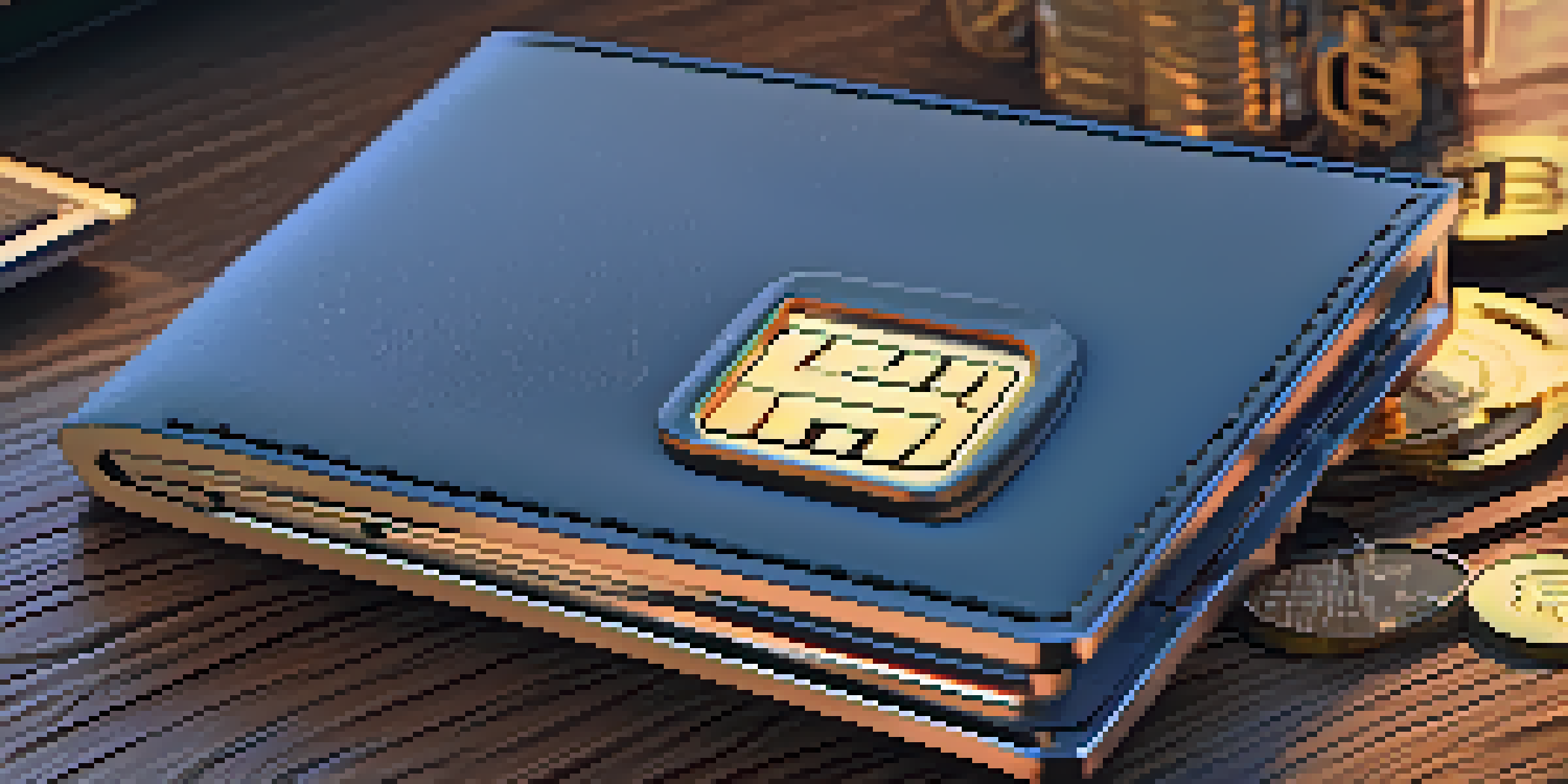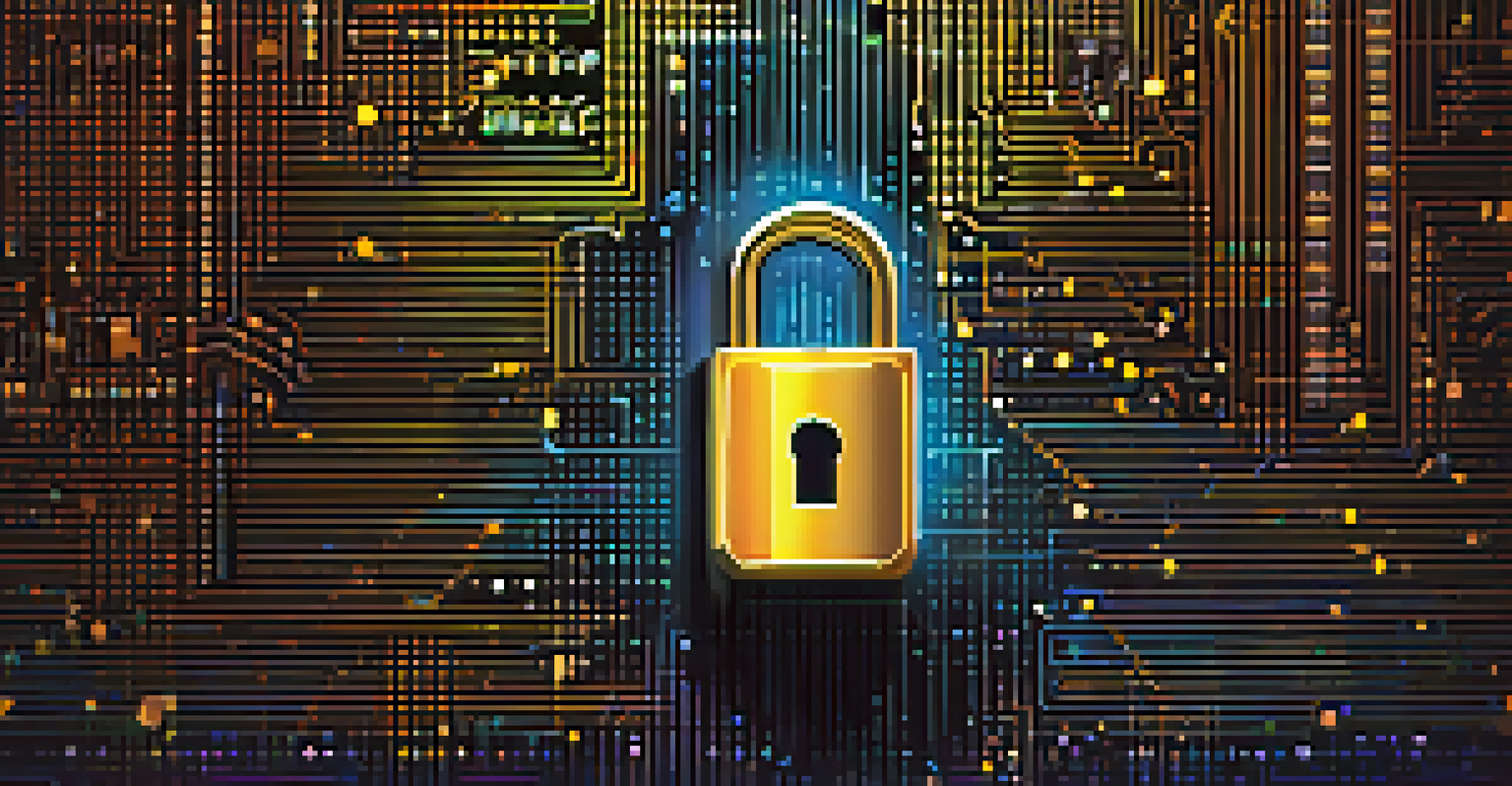Securing Private Keys: Essential Practices for Bitcoin Users

Understanding Private Keys and Their Importance
Private keys are the secret codes that allow you to access and manage your Bitcoin. Think of them as the keys to your digital wallet; without them, your funds are locked away. The security of these keys is paramount because anyone with access to them can control your Bitcoin.
The best way to predict the future is to create it.
If someone steals your private key, they can transfer your Bitcoin to their own wallet without your consent. This makes understanding and safeguarding your private keys essential for every Bitcoin user. It’s not just about protecting an investment; it’s about securing your financial future.
In essence, your private key acts as your identity in the Bitcoin network. Just as you wouldn’t share your bank account password with anyone, you should treat your Bitcoin private keys with the same level of confidentiality.
Use Hardware Wallets for Maximum Security
Hardware wallets are one of the safest options for storing your private keys. These devices are built specifically to keep your keys offline, away from potential online threats. By keeping your keys in a hardware wallet, you significantly reduce the risk of hacking.

Imagine hardware wallets as a safe deposit box for your Bitcoin. Just like you wouldn’t leave valuable items out in plain sight, your private keys deserve the same level of protection. Many popular hardware wallets are user-friendly, making them accessible for both beginners and seasoned users.
Secure Your Private Keys
Protecting your private keys is essential for safeguarding your Bitcoin and financial future.
Before purchasing a hardware wallet, research reputable brands and read user reviews. A good hardware wallet not only protects your keys but also provides a seamless experience when accessing your Bitcoin.
Implement Strong Passwords and Two-Factor Authentication
Using strong, unique passwords is a fundamental step in securing your private keys. A good password should be long, complex, and should not be used for multiple accounts. Combining letters, numbers, and special characters can help create a robust password that is difficult to guess.
In the world of cybersecurity, vigilance is key.
In addition to strong passwords, enabling two-factor authentication (2FA) adds another layer of security. 2FA requires a second form of identification, typically a code sent to your phone, which makes it much harder for unauthorized individuals to access your account. Imagine it as having a double lock on your front door.
Always remember to store your passwords securely, perhaps using a password manager. This not only helps you keep track of your complex passwords but also ensures that they remain confidential and protected.
Backup Your Private Keys Regularly
Backing up your private keys is crucial in case of device loss or damage. Just like you might keep a copy of important documents in a safe place, it’s wise to create backups of your keys. This way, if something goes wrong, you can still access your Bitcoin.
There are various methods to back up your private keys, such as writing them down on paper or using a secure digital method. Always ensure that these backups are stored in a safe place, away from potential theft or damage. Consider using fireproof safes or secure cloud storage options.
Use Hardware Wallets
Hardware wallets provide maximum security by keeping your private keys offline and safe from online threats.
Regularly updating your backups ensures that you have the most recent version of your keys. This practice not only provides peace of mind but also safeguards your investments in the ever-evolving world of cryptocurrency.
Stay Informed About Security Threats
The landscape of cryptocurrency is constantly changing, often with new security threats emerging. Staying informed about potential risks can help you adapt your security measures accordingly. Follow reputable sources, blogs, or forums dedicated to cryptocurrency news.
Consider subscribing to newsletters or joining online communities where you can learn from others’ experiences. Knowledge is power, and understanding the latest scams or hacking techniques can help you avoid falling victim to them. It’s like having a radar that alerts you to impending storms.
By remaining vigilant, you can adjust your strategies to protect your Bitcoin assets better. Awareness is the first line of defense in the ever-evolving world of cryptocurrency security.
Avoid Public Wi-Fi When Accessing Your Wallet
Public Wi-Fi networks can be convenient, but they also pose significant security risks. Using these networks to access your Bitcoin wallet can expose your private keys to hackers. Imagine leaving your front door wide open while you're away; it invites trouble.
If you must use public Wi-Fi, consider using a Virtual Private Network (VPN) for an extra layer of security. A VPN encrypts your internet connection, making it much harder for anyone to intercept your data. However, the safest option is always to use a secure, private network.
Stay Informed About Threats
Keeping up-to-date with security risks helps you adapt your measures and protect your Bitcoin assets effectively.
By being cautious about your network usage, you can protect your private keys from potential threats. Always prioritize security over convenience when it comes to accessing your Bitcoin.
Educate Yourself on Phishing Scams
Phishing scams are a common method used by cybercriminals to steal private keys and personal information. These scams often come in the form of fake emails or websites that appear legitimate. Recognizing these scams is essential for safeguarding your Bitcoin.
Always double-check URLs and be cautious about clicking on links from unknown sources. If an email or message seems suspicious, take a moment to investigate before taking any action. Think of it like checking for a spoofed website before entering your bank details online.

Educating yourself on how to identify phishing attempts can significantly reduce your risk of falling victim to such scams. The more informed you are, the more empowered you become to protect your digital assets.
Conclusion: Prioritize the Security of Your Private Keys
Securing your Bitcoin private keys is not just a recommendation; it’s a necessity. Implementing these essential practices can help you protect your investments and ensure peace of mind. Remember, the responsibility to secure your keys lies with you.
As you adopt these security measures, you’ll find that protecting your private keys becomes second nature. From using hardware wallets to staying informed about scams, each step you take builds a robust defense against potential threats. It’s like putting on armor before heading into battle.
In the world of cryptocurrency, knowledge and vigilance are your best allies. By prioritizing the security of your private keys, you can enjoy the benefits of Bitcoin with confidence and peace of mind.